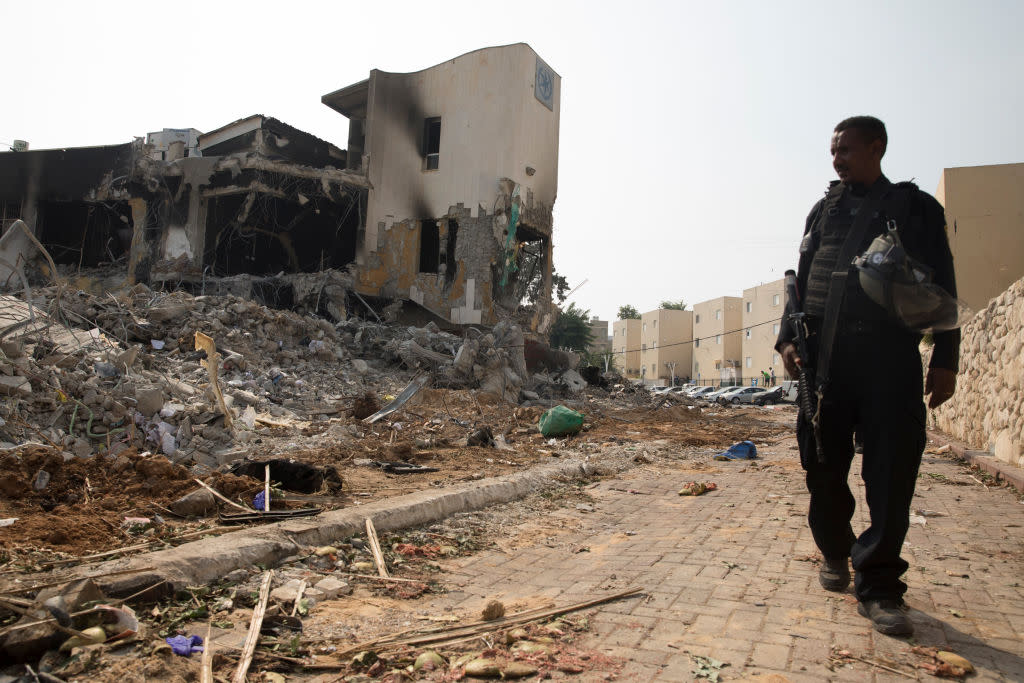Bipartisan U.S. House caucus planning for post-war Middle East

- Oops!Something went wrong.Please try again later.
- Oops!Something went wrong.Please try again later.
- Oops!Something went wrong.Please try again later.
Police Officer walks near a police station that was destroyed after a battle between Israeli troops and Hamas militants that have take the station on October 8, 2023 in Sderot, Israel. On Saturday, the Palestinian militant group Hamas launched the largest surprise attack from Gaza in a generation, sending thousands of missiles and an unknown number of fighters by land, who shot and kidnapped Israelis in communities near the Gaza border. The attack prompted retaliatory strikes on Gaza and a declaration of war by the Israeli prime minister. | Footage by Amir Levy/Getty Images
WASHINGTON — A bipartisan group of U.S. House lawmakers has launched an effort to spur planning for what the Gaza Strip will look like the “day after” the Israel-Hamas war, even as agreement over a U.S.-backed ceasefire proposal remains elusive.
Democratic Reps. Brad Schneider of Illinois and David Trone of Maryland, along with Republicans Ann Wagner of Missouri and Cathy McMorris Rodgers of Washington, formed the Gaza Working Group with the goal of involving Congress in discussions about the future of Israeli-Palestinian relations, according to a joint press release sent to reporters Tuesday.
The four leaders formed the Abraham Accords Caucus in 2022 following the 2020 agreement to normalize relations between Israel and the three Arab states of Bahrain, Morocco and the United Arab Emirates. The companion caucus in the U.S. Senate is led by Democratic Sens. Jacky Rosen of Nevada and Cory Booker of New Jersey, alongside GOP Sens. James Lankford of Oklahoma and Joni Ernst of Iowa.
“As leaders of the Abraham Accords Caucus, we have an obligation to envision and work towards a future in which Israel — and all of the Middle East — is free of the evil that is Hamas,” McMorris Rodgers said in a statement.
Trone called the working group a “promising start.”
“Moving forward, we must work together to ensure Hamas is no longer in power by establishing a free and fair democracy in Gaza, secure the safety of Israel and surrounding nations and provide hope and diplomacy for their people,” he said in a statement.
The group did not detail or endorse a specific plan for the Gaza Strip after the conflict, but rather aims to “convene meetings to engage” executive branch officials, diplomats and experts to “deliberate and ask questions regarding pertinent issues.”
The group’s first meeting was a “frank, off-the-record exchange” with Israeli Ambassador to the U.S. Michael Herzog, according to the joint release. The group met with Herzog on June 4, according to Schneider’s spokesperson.
Wagner said stabilizing the region is important to maintaining a “united front to counter Iran and its proxies.”
“It cannot be the United States’ job to rebuild Gaza, but together with Israel we can choose who sits at that table,” Wagner said in a statement.
Ceasefire talks
The lawmakers’ announcement comes as U.S. Secretary of State Antony Blinken was in the region for his eighth visit since the start of the conflict, this time to urge agreement on the latest cease-fire proposal outlined by President Joe Biden on May 31.
Blinken told reporters in Tel Aviv Tuesday that Israeli Prime Minister Benjamin Netanyahu “reaffirmed” his commitment to the proposal.
“So everyone’s vote is in, except for one vote, and that’s Hamas. And that’s what we wait for,” Blinken said.
Fourteen nations on the 15-member United Nations Security Council, including the U.S., endorsed the proposal Monday. Russia abstained.
The Israel-Hamas war has been ongoing since Hamas militants infiltrated Israel’s southern border on Oct. 7, killing roughly 1,200, according to Israel’s figures.
The death toll from Israel’s continued offensive in the Palestinian territory of Gaza reached 36,379 at the end of May, according to the Health Ministry in the Gaza Strip run by the Hamas-controlled government.
The post Bipartisan U.S. House caucus planning for post-war Middle East appeared first on Michigan Advance.

